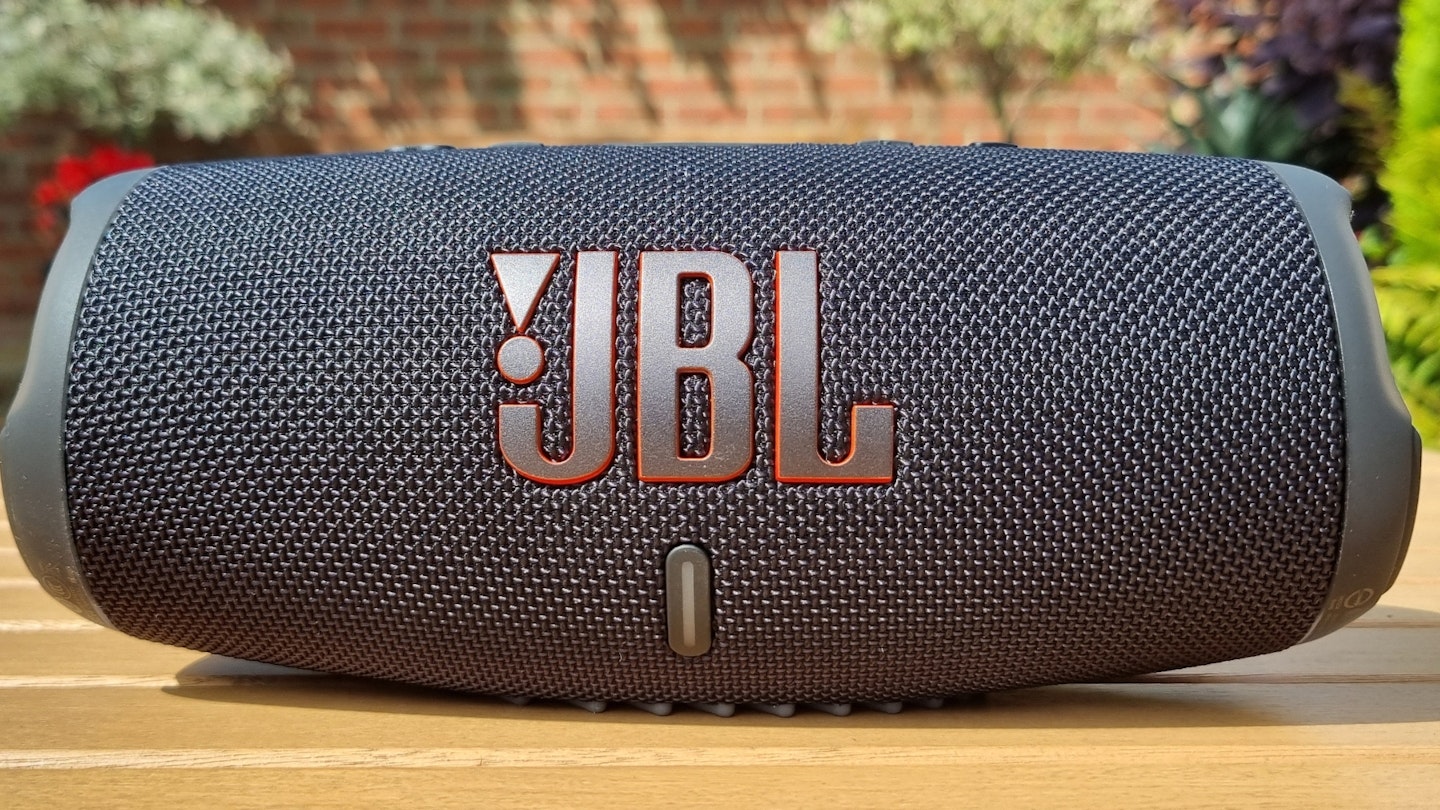JBL has been known for bassy sound on a budget for decades now, and it has adapted to the modern market very well, becoming known amongst some of the best speakers available. It's one of the biggest names in the Bluetooth speaker scene; it’s not hard to see why, as its reputation for big bass continues with its portable speakers. Though technically portable, the JBL Charge 5 lands with a bang, bridging the gap between portable speakers and old-school boom boxes.
We’ve been impressed in the past with the Clip, Go and Flip portable speakers, but this is the biggest one we’ve tested out of that range. It’s much like the smaller Flip 6, with the same driver layout and overall design, though the Charge builds on it in many ways. Offering even bigger bass, a bigger battery, and the added bonus of a power bank feature to keep your device charged as you listen out and about.
First released in 2022, it remains a pretty popular option for party speakers, but will it hold up under testing? Olivia takes on the Charge 5 and discovers if bigger means better.
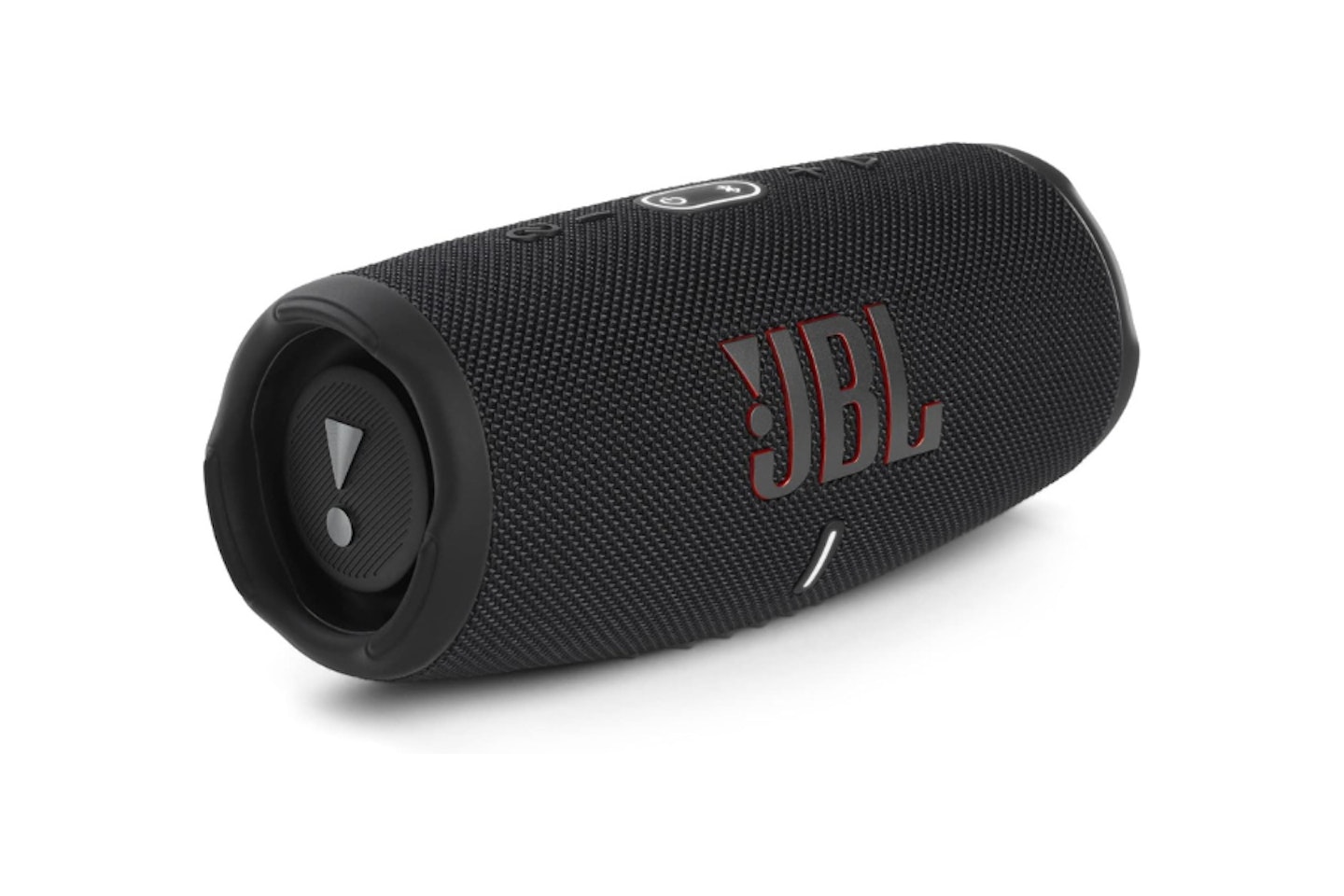 JBL
JBLPros
- Great frequency response that can be tuned through the JBL app
- Power bank feature is a massive bonus, and an extra use for the big battery
- Waterproof, but also floats to avoid any lost speakers at any pool parties
Cons
- For what it's trying to do, the bass was very underwhelming
- Bass can be adjusted in the app, but the options are very limiting
| Drivers | Racetrack driver, tweeter, dual bass radiators |
| Output power | 40W |
| Battery | 20 hours |
| Frequency response | 60 Hz - 20k Hz |
| Waterproof | IP67, floats |
| Dimensions | 220 x 96 x 93 mm |
| Weight | 0.96 kg |
- A sturdy speaker, good for picnics, BBQs and other party settings, but for concentrated listening? Maybe not so much. The power bank feature pushes portability, but the weight and size says otherwise.
Where the speaker shines
The Charge 5 is the fifth generation of the JBL speaker, introduced over a decade ago and has been improved ever since. The scale of JBL speakers is sometimes hard to quantify, but there is a definite line. Starting at the very compact Go, then the Clip, then the Flip, and bridging the gap between the portable and the boom box is the Charge. It is certainly a big speaker despite it still being classed as portable. It felt like someone stretched out a Flip 6, as it has the same design, (mostly) the same layout, and the same speakers, which was a surprise given the size. Most of the internal space is taken up by space for the passive bass-reflex design, but it would have been nice to have an update to the speaker array – perhaps instead of the single driver and tweeter, they could have added another driver.
Despite this issue with the construction, the speaker is still built to last. Armed with an IP67 waterproof rating and the ability to float, this speaker is well-suited for pool parties or holidays. When wet, all you need to do is shake it quickly, and it's ready to go – the mesh covering the speaker isn't a fabric but more a plastic stitching. It feels nice to the touch and follows the modern trends well in this department. Some may say they're tired of the fabric speaker design, but I like it compared to other speakers' bare plastic/metal designs.

One of the big draws of this speaker compared to smaller, cheaper models isn't just the soundstage but the added features. Though it was released in 2021, the Charge 5 has a feature only really seen in more modern speakers: a built-in power bank.
The bigger 20-hour battery can dedicate some of that juice to keeping your phone going for longer listening sessions. Bluetooth connectivity can be a real drain on the battery, and this ensures that the design and convenience of Bluetooth don't get in the way of your device's power requirements – at least, on paper, that is what it's meant to do.
In my testing, I found the charging to be very slow, and my phone informed me that it would take nearly 6 hours to charge my phone to full from 26 per cent. Even when not playing music, the times were this long.
It may be an issue with the technology's infancy at the time of production, but it still does the job, just rather slowly. It charges your phone via a USB port at the back, but it would be nice to see them consolidate into just requiring the USB-C port in the future. However, it may even help with charging times.
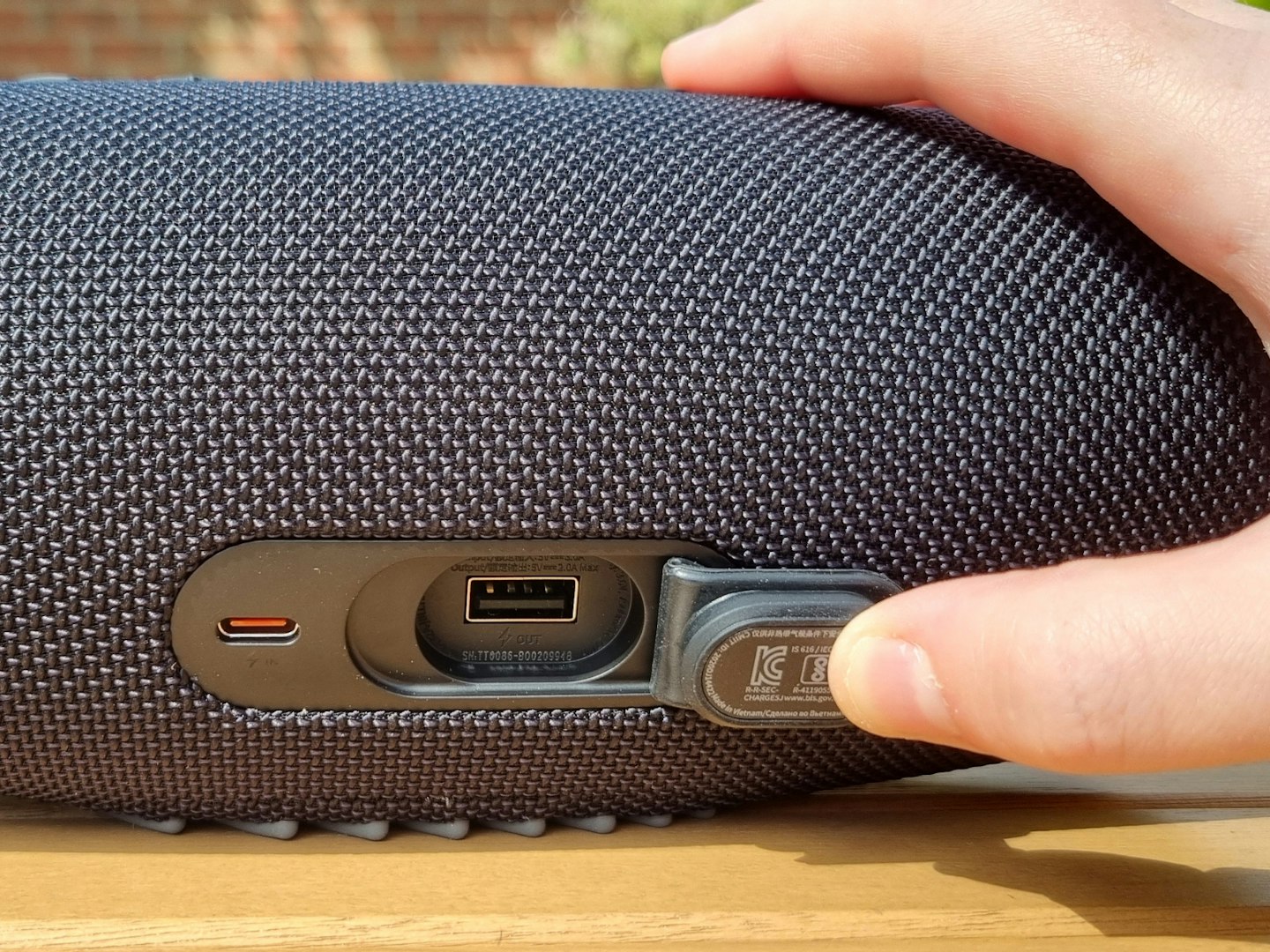
Now, the bit that really matters, how does it sound? Good.
I put it through its paces, with a lot of bass-heavy tracks that would test the extra bass reflex space it takes up, as well as conventional tracks, to see how it handles the everyday. A good song for in-between is 'Birds Of A Feather' by Billie Eilish, as it has a constant low drum rhythm with some very high and airy vocals. It managed the balance well enough, though it seemed sometimes I felt the bass more than I heard it, as the vibrations would go through my desk often; even if I had ear defenders on, I'd still be able to keep track of the beat I wager.
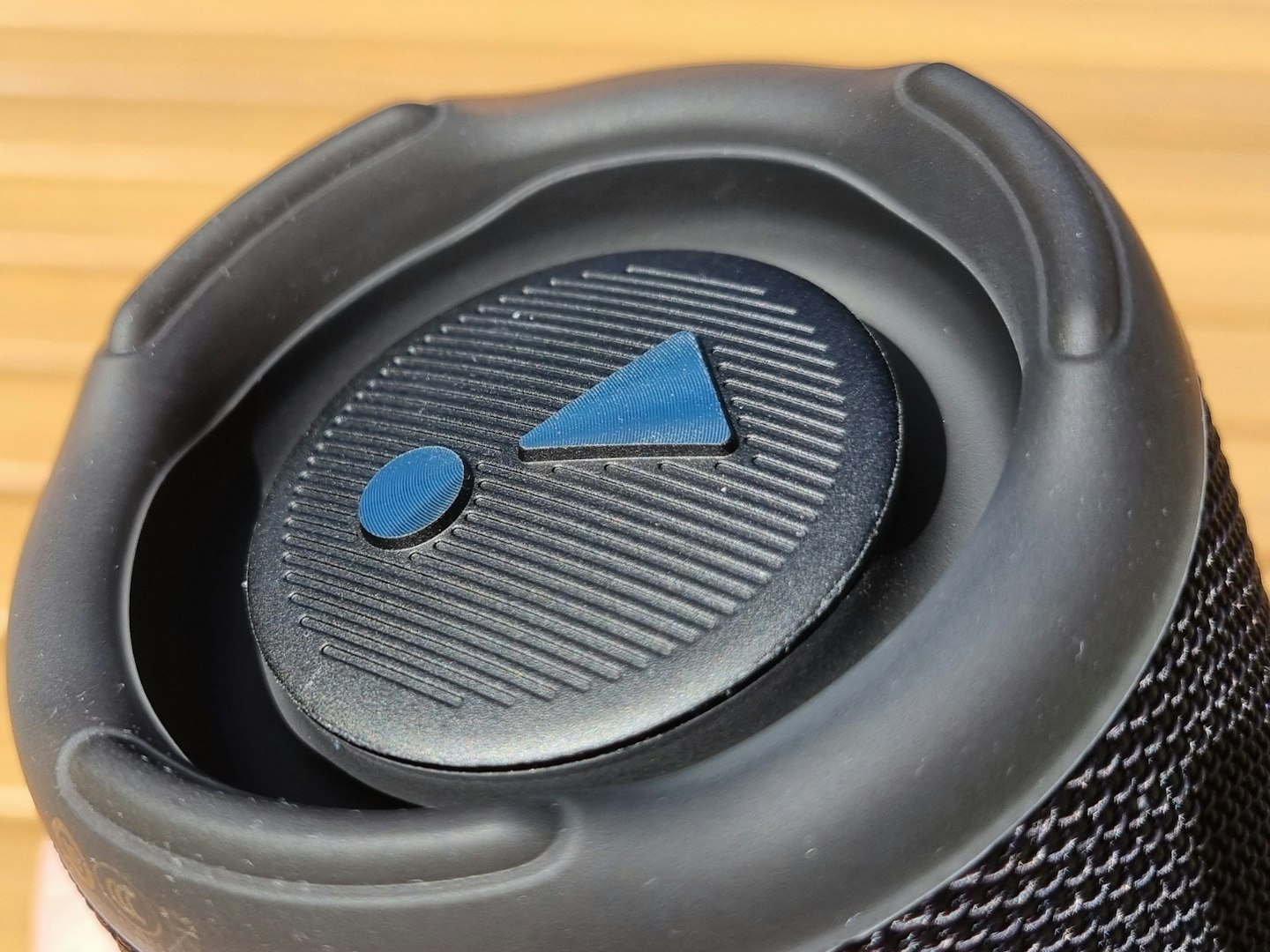
The places it really shines are when it comes to sub-bass. Though frequency response tracks may say otherwise, this was a speaker best suited to sub-bass performance. My favourite song to test this with is 'Outro' by M83, which lets me listen to parts of the music I rarely hear with your standard Bluetooth speaker. It has some issues at the higher end of the song, but still, no one can argue about the performance it gives from something you fit in a backpack. It sounds as good at 20 per cent volume as it does at 80 per cent (though 100 per cent shows the upper limits as there are some artefacts).
It works well in other use scenarios as well, such as podcasts. I'm also a sucker for afternoon radio, and it brings the voices through clear as a whistle. For films, it replicates the mix well, and the sub-bass makes action movies really pop with the speaker. While watching a film on a phone hooked up to a speaker about four times its size may be unconventional, for testing it was brilliant. There were some sync issues, however, as is expected with Bluetooth devices, but this only gets in the way a little and you soon get used to it.
Overall this is a good speaker, handy to have around the house as well as on hand for trips. But things aren't all great with it I must say.
High expectations and missed opportunities
While it's a good speaker for everyday use, if I had to describe a feeling associated with it, it would be "let down". For the size, price, and promise of the speaker, I was expecting to be really wowed in the sound department. I'll give credit where it's due. As stated earlier, the sub-bass is outstanding, but that's as much credit as I'm willing to give, as everything else is rather okay.
I came with high expectations for the money you're paying for the Charge 5. In my testing, I found the high end to be rather sharp and the bass to be rather disappointing. Comparing this speaker with my old Bose Soundlink Mini from 2013, I thought the bass was better executed in the latter than in the former. This was with the standard EQ the speaker comes with, so I went to the JBL app to try and adjust but was starkly reminded of the underwhelming options for EQ adjustment.

Boosting the bass made everything extra muddy. Boosting the top end made everything a little too sharp, and there is little room in between because of the limited adjustment options. A lot of the issues I have with the soundstage could have been solved if there were more options for customisation in the app. A little customisation is better than none, don't get me wrong, but there is room for improvement. I don't know if this is something JBL is working on, but right now, it is severely outclassed in this department by the budget speaker brand Tribit and its companion app.
The soundstage is one of the most important parts of the speaker, but what also matters is the case the soundstage comes in, the construction of the speaker. It replicates the JBL branding well, with the same style as other speakers in the line-up, though there are some notable differences.
Though it weighs more than the Flip 6, it doesn't feel like it when holding both in either hand, and I wonder if that's entirely a good thing. Something can be light whilst still feeling sturdy, and I don't get that feeling with the Charge 5. Knocking on, it rings through a disconcerting hollow noise, which should be for the bass reflex space but only shows how little you get in this speaker. It's a missed opportunity to add another driver to take advantage of the bigger battery, bigger case, bigger everything, but no. The driver they have is slightly more powerful than smaller JBL models, but nothing that makes sense to me for the size.
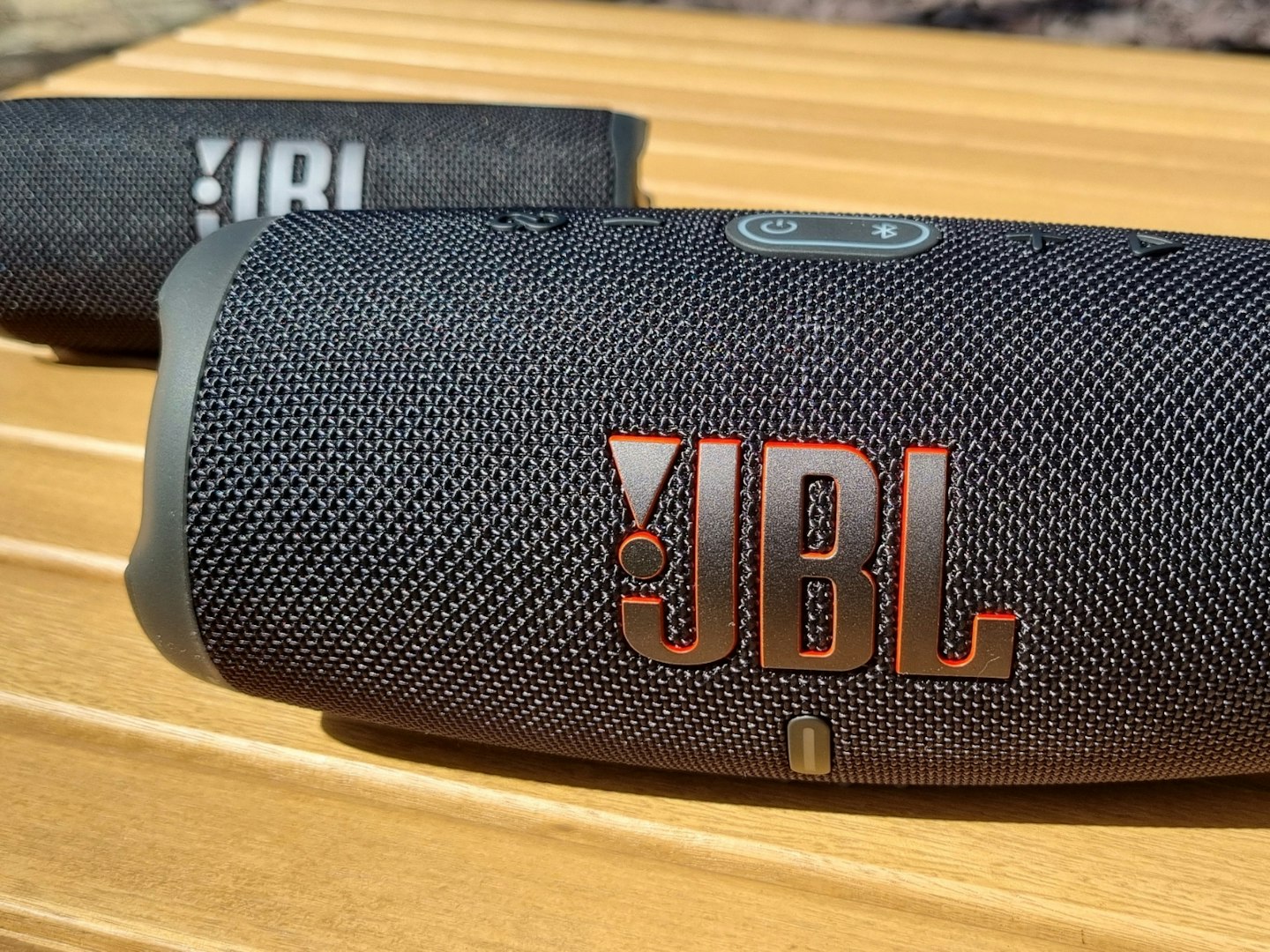
The interface has some gripes for me, too; the buttons feel stiff, and skipping a track requires me to press hard on one side of the speaker, making it rock back and forth on whatever surface I have it on. The buttons were better on other JBL speakers – they were tactile but easy to operate. I don't get the difference between them since they were released in the same year. The stand is another issue for me, as on the Flip 6, it was a small rubber foot that angled the speaker up, and it was better positioned for acoustics and soundstage as it directed the sound towards a person's ears. On the Charge 5, the rubber grooves are good for traction but make the speaker sit flat on a surface, so the speakers point closer to your chest than your head.

To sum it up, the Charge 5 surprised me with its so-so performance, from the great expectations set by the Flip 6 I was let down by the minimal thought put into some elements of this speaker.
Price and competition
The price remains one of the biggest hang-ups for me. At the RRP of £169.99, it can weigh heavily on the wallet, though it is on sale often, most likely due to the model's age, sometimes for as little as £99.99. At that price, it's definitely a steal for what you get. However, you can get a speaker from a more high-end brand, such as Bose or Sonos, for a similar RRP. It can be argued that they would be where your money is better spent, you'd be getting more features, updated internals, and a lot of other bonuses.
The best advice I can give in regards to the price of this speaker is to wait for it to go on sale or go for the smaller and cheaper Flip 6. You'd be getting the most value for money that way, as it's still a great speaker for the average listener. It's only when someone nitpicky (like me) comes along that cracks begin to show.
Who is it for?
While it has a wide appeal, there are some limitations to the Charge 5 being a speaker for just about anyone. I will admit, I've been reviewing this speaker as someone who has seen a lot of speakers, and as someone who is very fussy when it comes to audio. For having at a house party, BBQ or a similar large gathering, this speaker fills the room like nothing I've seen from it's size. A good demographic for it to target would be students, however the price doesn't quite fit there.
For the money you're spending and the sound you're expecting, if you plan on using it primarily around the house, a good set of bookshelf speakers would serve you better. If you plan on taking it out with you, it's a touch too bulky to really be convenient for that, so I'd point you towards a smaller speaker like the often mentioned JBL Flip 6. For me, I struggled to really pin down it's niche, at least one that made sense financially.
Would we recommend it?
The JBL Charge 5 is a great speaker, genuinely great for your average listening experience, with enough bass to fill a room easily. But when it comes to recommending it, I have to stop short. All of those things can be achieved through the Flip 6 for much less money, as well as saving space and weight along the way. If you're dead set on wanting a power bank with your big bass speaker, there are other options, such as the Tribit StormBox Flow or even the Micro 2.
Something to bear in mind is that this speaker was released in 2021, and if I were looking at it from 3 years ago I'd probably be a lot more impressed than I am today. But the truth is that the speaker world has caught up, and surpassed JBL in the meantime. I'll be keeping a close eye on the JBL line-up in future nevertheless, I'm very open to being surprised in the future, but in 2024 I don't think the Charge 5 is quite worth the price tag.
More items to consider
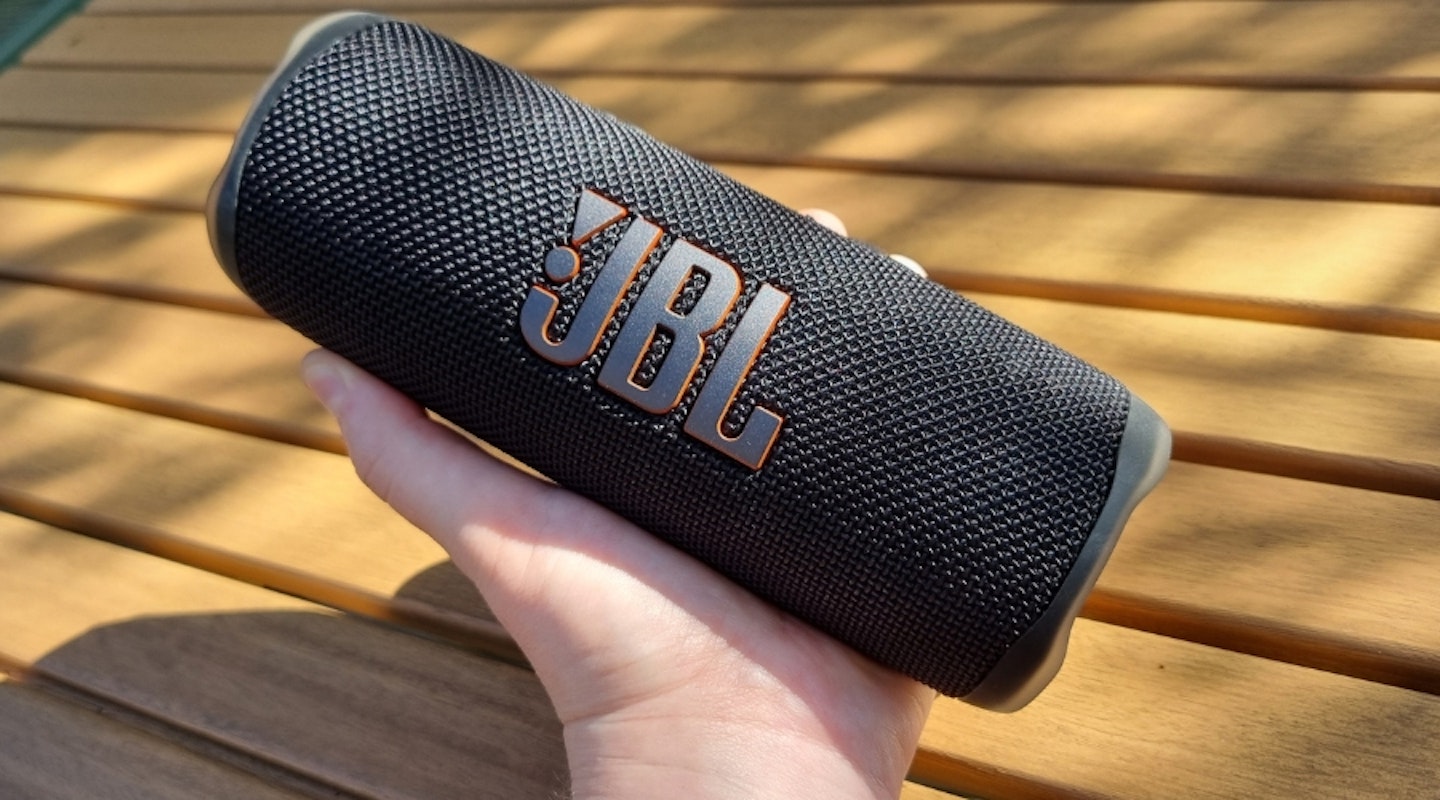 What's the Best/Olivia Sheed
What's the Best/Olivia Sheed The little cousin of the Charge 5, with just as much punch in our opinion. Fitting in what we believe to be the ideal size for a Bluetooth speaker, it wastes no space with it's bass radiators, allowing for big bass from such a small speaker. In addition to that, it's perfect for whatever environment you put it in, thanks to the IP67 waterpoof rating, and it's compact size and weight mean you'll not have to worry about luggage allowance when you go.
Though it may not have the power bank feature like the Charge 5, it has a lot to love all the same. If you like the sound of the Charge 5 but want to save some space (and some pennies) then you'd be mad to miss the Flip 6. If you need any further convincing, read our full review here.
Pros
- Great bass from such a small speaker
- Wide dynamic range for listening at high or low volume
- Perfect size for taking on holiday or camping
Cons
- No power bank feature unfortunately
| Drivers | Racetrack driver, tweeter, dual bass radiators |
| Output power | 30W |
| Battery | 12 hours |
| Frequency response | 63 Hz - 20k Hz |
| Waterproof | IP67 |
| Dimensions | 178 x 68 x 72 mm |
| Weight | 0.55 kg |
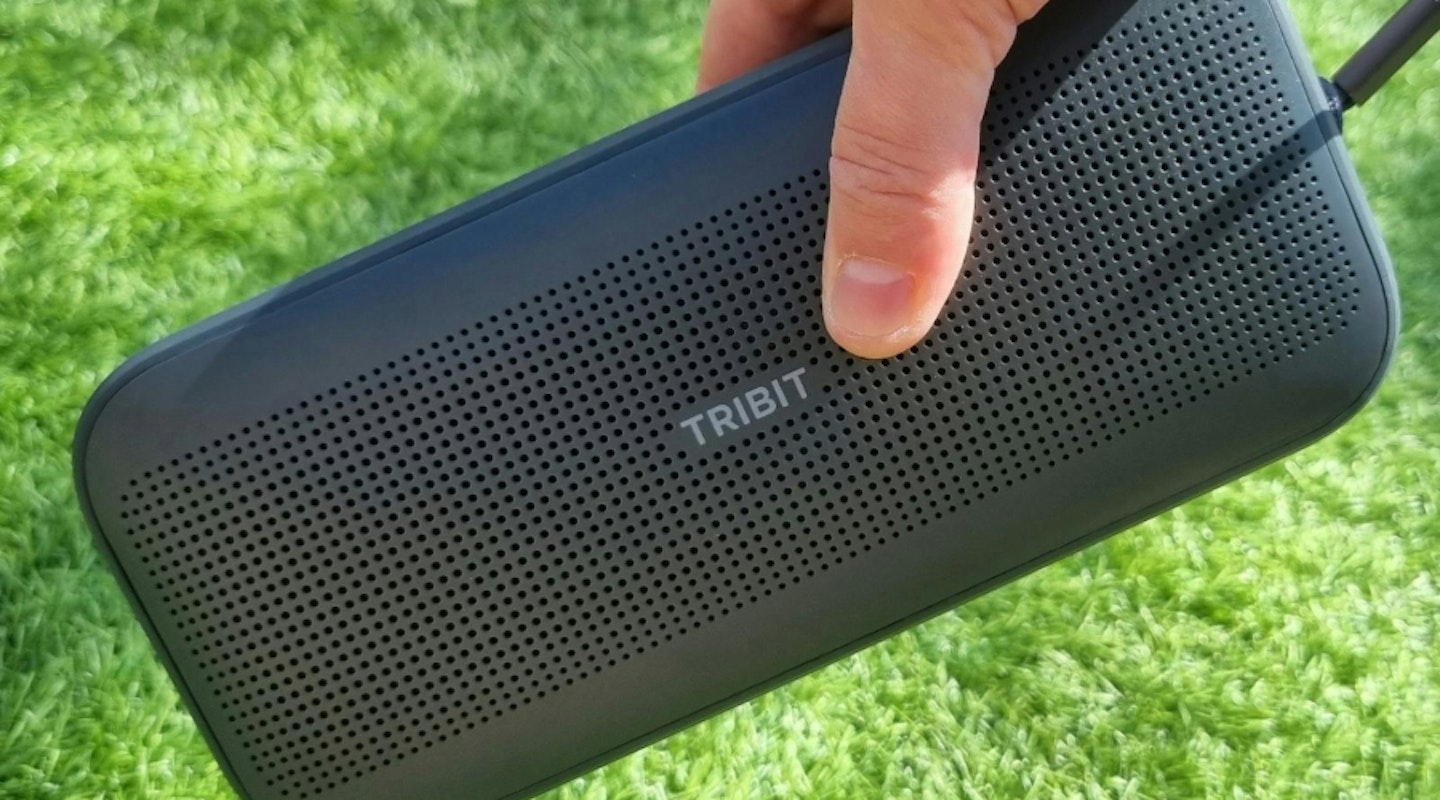 Olivia Sheed/WTB
Olivia Sheed/WTBA budget (but still bougie) offering from a brand that has surprised the What's the Best team a lot over the last few months, Tribit don't disappoint. The Flow packs a big punch, thanks to the X-bass technology inside, as well as an EQ button on top to change how your music sounds quickly without needing to go into the app.
It's a sturdy offering, with a metal speaker grille and well-build enclosure, as well as the IP67 rating, means this speaker can take whatever you throw at it. The design is a little plain, considering the other speakers they currently have on offer, it would have een nice to see them stick with the sleek branding they've nailed on other products. But don't let looks fool you, this is one powerful speaker, with plenty of bass on a budget.
Pros
- Quick bass boosts with the EQ button
- Whopping 30 hours of battery, with power bank feature
- Metal speaker grille makes it sturdy enough for whatever you throw at it
Cons
- Puts performance over design
| Drivers | 62mm driver, passive bass radiator |
| Output power | 25W |
| Battery | 30 hours |
| Frequency response | 50Hz to 20kHz |
| Waterproof | IP67, floats |
| Dimensions | 222.8 x 114.8 x 58.9 mm |
| Weight | 666g |
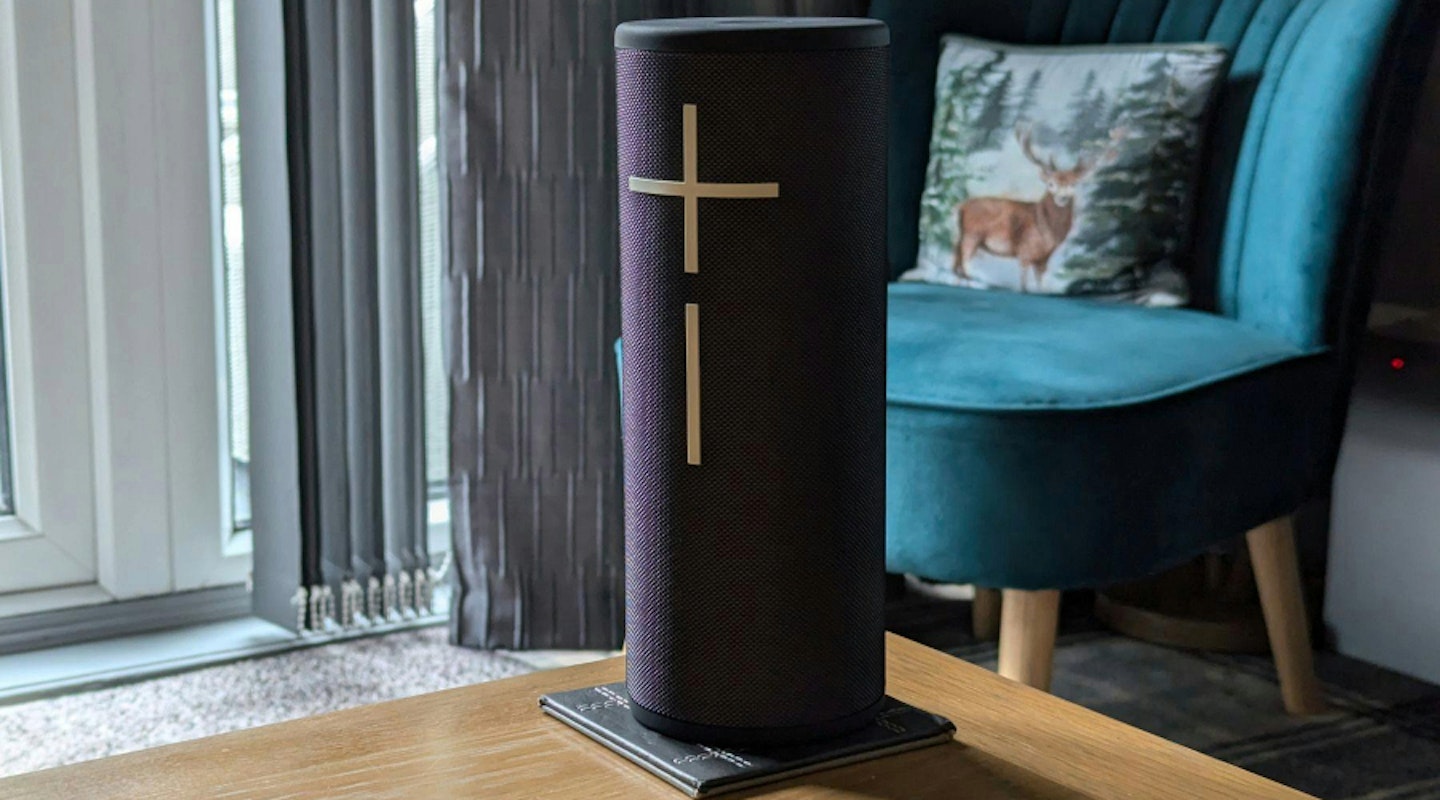 Kyle Purves/WTB
Kyle Purves/WTBOne of the new breed of Ultimate Ears speakers, and ready to make a big impact already. The Megaboom 4 comes with updated charging, the ability to connect specific playlists to the 'magic button' as well as offering powerful 360 sound.
The design is minimalist and sleek, while also offering functionality. The megaboom floats easily in water, as well as being IP67 water and dustproof, perfect for partying anywhere. Though there have been some reviews mentioning issues with the top-end EQ, don't let that stop you from checking out one of the beefiest speakers on the market right now.
Pros
- Softer bass radiators than the previous version
- Made of a minimum of 54% recycled plastic
- Sleek minimalist design makes it well suited to any environment
Cons
- Some have reported issues with top-end EQ when listening
| Drivers | Two 50mm x 50mm full range, two 55 mm x 86 mm passive radiators |
| Output power | Not specified |
| Battery | 25 hours |
| Frequency response | Not specified |
| Waterproof | IP67, floats |
| Dimensions | 184 x 73 x 73 mm |
| Weight | 936g |
Who tested it?
Olivia Sheed is a tech writer for What’s the Best, specialising in gaming technology, computers and portable audio. A self-identified audiophile, she has started to dip her toes in the realm of high-fidelity listening, thus making her a perfect fit for speaker testing. She listens to music in one way or another every day, if not every minute.
How we tested
For the duration of testing, the JBL Charge 5 replaced the JBL Flip 6 for a more direct comparison on what was different between two models from the same company. Kept at my desk, I'd connect via Bluetooth and listen whilst working, meaning this speaker has seen at least 25 hours of testing. The music used was all from Tidal for high-quality streaming, and crossed a range of genres that seek to push the speaker's frequency response to the limits. It has also been used in other use scenarios, such as for podcasts and watching movies, in a range of listening environments including outdoors and in the shower.
How What's The Best test products
Struggling to navigate the audio world? We provide unbiased reviews for real listeners.
At What's The Best, we ditch the technical jargon and deliver sound reviews for sound people. Our team of audio enthusiasts puts everyday speakers, headphones, and more through their paces in real-world listening scenarios. We don't waste your time with staged tests – we focus on how these products actually perform for everyday music lovers.
The result? Unbiased buying advice you can trust. We only review the most relevant and impactful audio products on the market, so you know you're getting the latest insights. Can't find a review for your specific gear? We're constantly expanding our review database, so stay tuned!
Want to dive deeper into how we test audio products? Visit our dedicated page detailing how we go about performing our audio reviews.
Olivia Sheed is a Tech Writer and Reviewer at What’s The Best. Here she writes reviews, how-to guides and articles across all things technology.
Her interests align with "anything nerdy." Olivia is an avid fan of TTRPGs, board games, miniature painting, and video games. Outside of that, she loves to discuss horror films, campy classics such as those from Hammer Film Productions in the 70s are her favourite for a comfy watch. An avid hiker, she visits the Lake District often, for both walking and wild swimming.
